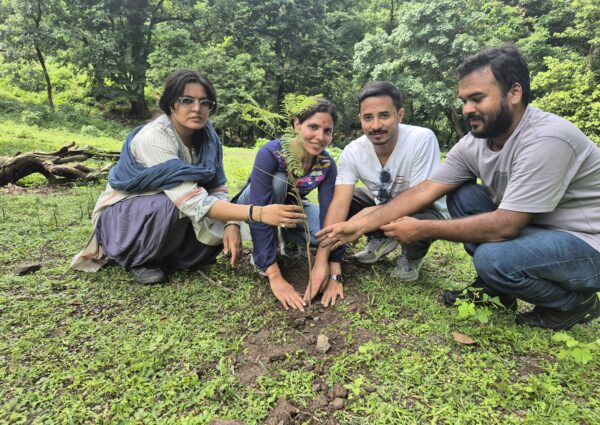- Home
- Our Projects
- 2019-20
2019-20
2019-20
At Green Pahadi Foundation (GPF), we believe in the power of rural communities to shape their own future. Through innovative projects like the World Bank Funded Decentralized Watershed Development (GRAMYA Phase-II) and the ONGC Funded Skill Development with Dharma Life Foundation, we are creating pathways to sustainable livelihoods, empowering women, and fostering agricultural growth in the heart of Uttarakhand.
Our mission is clear: to enhance the quality of life for rural communities through sustainable agriculture, entrepreneurship, and watershed management. By focusing on women empowerment, we are not only helping women find their voice but also ensuring they have the tools to lead in the fields of agribusiness and sustainable farming. With these initiatives, we are creating long-lasting economic opportunities, fostering self-reliance, and strengthening the backbone of rural India.
These projects are more than just developmental efforts; they are stories of transformation, hope, and resilience. From mushroom cultivation that fuels local economies to watershed management that secures the future of agriculture, every step we take brings us closer to a more empowered, sustainable, and prosperous rural India.
World Bank Funded Project - Decentralized Watershed Development (GRAMYA Phase-II)
Fostering Agribusiness and Sustainable Development in Uttarakhand
Green Pahadi Foundation (GPF) is dedicated to the socio-economic development of rural communities through impactful projects that promote sustainable livelihoods, environmental conservation, and women empowerment. One such initiative is the World Bank Funded Project – Decentralized Watershed Development (GRAMYA Phase-II), in partnership with the Watershed Department of Pauri Garhwal, Uttarakhand. This project aims to improve rural livelihoods by fostering agribusiness development, enhancing water management, and strengthening women’s participation in sustainable agricultural practices.
Vision Behind the Project
The GRAMYA Phase-II project focuses on the development of rural communities in the Ekeshwar and Pokhra development blocks of Pauri Garhwal district. It aims to:
- Enhance the livelihoods of rural farmers by promoting sustainable agriculture and agribusiness development.
- Support watershed management through the development of water conservation techniques, boosting agricultural productivity and improving water availability.
- Empower women farmers by creating self-help groups (SHGs) and encouraging their active participation in decision-making and economic activities.
Why Watershed Development Matters
Watershed development is essential for rural communities, particularly in hilly areas like Uttarakhand, where water scarcity and soil erosion are major challenges. By managing water resources and implementing soil conservation techniques, farmers can:
- Improve agricultural productivity and reduce dependency on rainfall.
- Ensure sustainable water use for farming and daily consumption.
- Protect natural resources, promoting a healthier ecosystem for future generations.
Area Span of the Project
The project spans the following areas:
- Ekeshwar Development Block
- Pokhra Development Block
These areas were selected for their agricultural potential and the pressing need for effective watershed management to address challenges such as water scarcity, soil erosion, and poor agricultural practices.

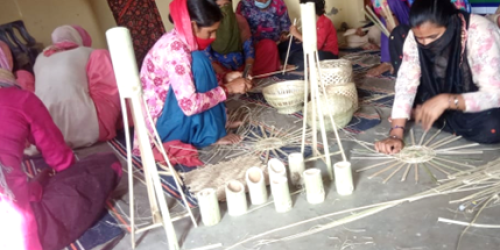
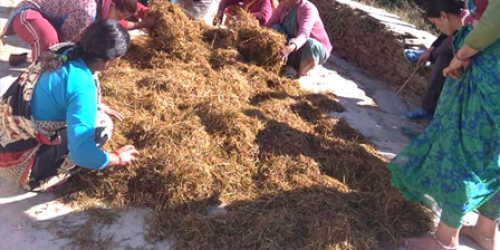
Project Implementation
GPF played a critical role in implementing this project by focusing on the development of sustainable agricultural practices and capacity building for farmers. Our efforts included:
Training Programs on Sustainable Agriculture:
- Conducting workshops on advanced farming techniques, soil conservation, and organic farming.
- Introducing farmers to watershed management techniques that improve water conservation and soil health.
Empowering Women through Self-Help Groups (SHGs):
- GPF formed and trained women farmers’ groups, encouraging them to take leadership roles in agricultural activities and watershed management.
- The formation of a Mushroom Federation under the project helped women entrepreneurs enhance their income through value-added mushroom products.
Creating Market Linkages for Agribusinesses:
- Facilitating access to local and regional markets for farmers’ products, ensuring better pricing and profitability.
- Developing market linkages for value-added agricultural products, including mushrooms, honey, and organic produce.
Monitoring and Evaluation:
- Implementing regular monitoring and evaluation processes to assess the success of interventions and adapt strategies to achieve maximum impact.
Accomplishments and Impact
-
Agribusiness Development:
- The project facilitated the creation of agribusinesses and value chains around products like mushrooms and organic vegetables, resulting in increased income for rural households.
-
Enhanced Water Management:
- Improved watershed management techniques contributed to better water availability for farming, increasing agricultural productivity and ensuring sustainability.
- Projects aimed at water conservation were successfully implemented, leading to better soil health and crop yield.
-
Women Empowerment and Economic Upliftment:
- The project trained over 500 women through SHGs, equipping them with the skills to manage agricultural businesses and actively participate in their community’s development.
- Women-led businesses flourished, and many became leaders in promoting sustainable farming practices in their communities.
-
Sustainable Livelihoods:
- The project’s focus on sustainable agriculture and watershed management created long-term livelihoods for farmers, significantly reducing vulnerability to climate change impacts such as droughts and floods.
- Training in mushroom cultivation, apiculture, and organic farming provided diverse income sources and increased farmers’ resilience.
ONGC Funded Project with Dharma Life Foundation
Transforming Rural Lives through Mushroom Cultivation and Entrepreneurship
At Green Pahadi Foundation (GPF), our mission to empower rural communities aligns seamlessly with initiatives promoting skill development, livelihood generation, and women empowerment. Through a collaborative effort with ONGC (Oil and Natural Gas Corporation, India) under its CSR program and the Dharma Life Foundation, this project focuses on fostering rural entrepreneurship while improving income generation opportunities for women in Uttarakhand.
The Vision Behind the Project
The primary goal of the project is to create sustainable livelihood opportunities by training rural women in entrepreneurial skills. The Dharma Life Entrepreneur (DLE) model aims to:
- Build self-confidence in rural women.
- Empower them to become financially independent.
- Enable them to contribute to their household income.
- Provide access to social impact products and services that improve quality of life.
By focusing on mushroom cultivation and value-added agriculture, the project aims to address challenges faced by rural communities, such as limited income sources and lack of access to modern agricultural techniques.
Area of Implememtation of Project
The project was implemented across key development blocks in Uttarakhand:
- Kot, Khirsu, Pabau, and Pauri in Pauri Garhwal District.
- Jakholi in Rudraprayag District.
These regions, known for their scenic beauty and agricultural potential, provided a fertile ground to promote sustainable farming practices and boost rural livelihoods.
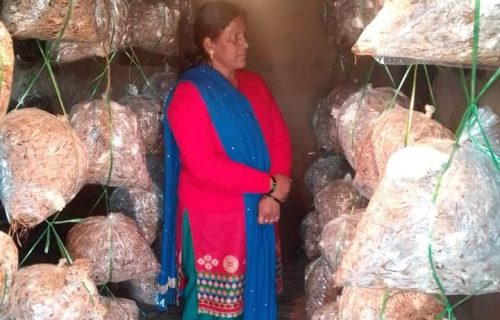
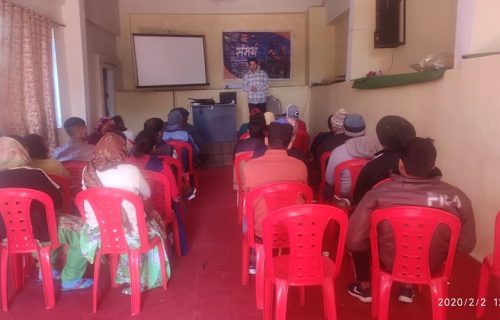
Empowering Women through Mushroom Cultivation
Mushroom cultivation has emerged as a highly effective means of livelihood generation due to its low cost, minimal land requirements, and potential for high returns. Recognizing its benefits, GPF organized a series of training programs for women Self-Help Groups (SHGs), focusing on:
- Mushroom cultivation techniques, from preparation to harvest.
- Advanced skills in value addition, including the production of innovative products like:
- Dry Mushrooms
- Mushroom Badi
- Mushroom Chap
- Mushroom Biscuits
- Mushroom Pickles
These training sessions not only enhanced their technical skills but also equipped them to manage small-scale agribusinesses.
Key Achievements of the Project
Skill Development and Capacity Building:
- Over 3,000 rural women received hands-on training in mushroom cultivation and agro-based entrepreneurship.
- Participants learned modern techniques for value-added agriculture, significantly boosting their confidence and technical expertise.
Income Generation Opportunities:
- By introducing innovative ways to process and package mushroom-based products, the project enabled women to access new markets and earn a stable income.
- Many women have reported increased respect and recognition within their families and communities due to their entrepreneurial success.
Economic Empowerment:
- The project fostered sustainable livelihoods, helping women move beyond traditional roles and contribute meaningfully to household earnings.
Community Impact:
- Mushroom cultivation has gained popularity as a reliable income source in these regions. The techniques shared during the training sessions are now being replicated by other farmers, amplifying the impact of the initiative.
